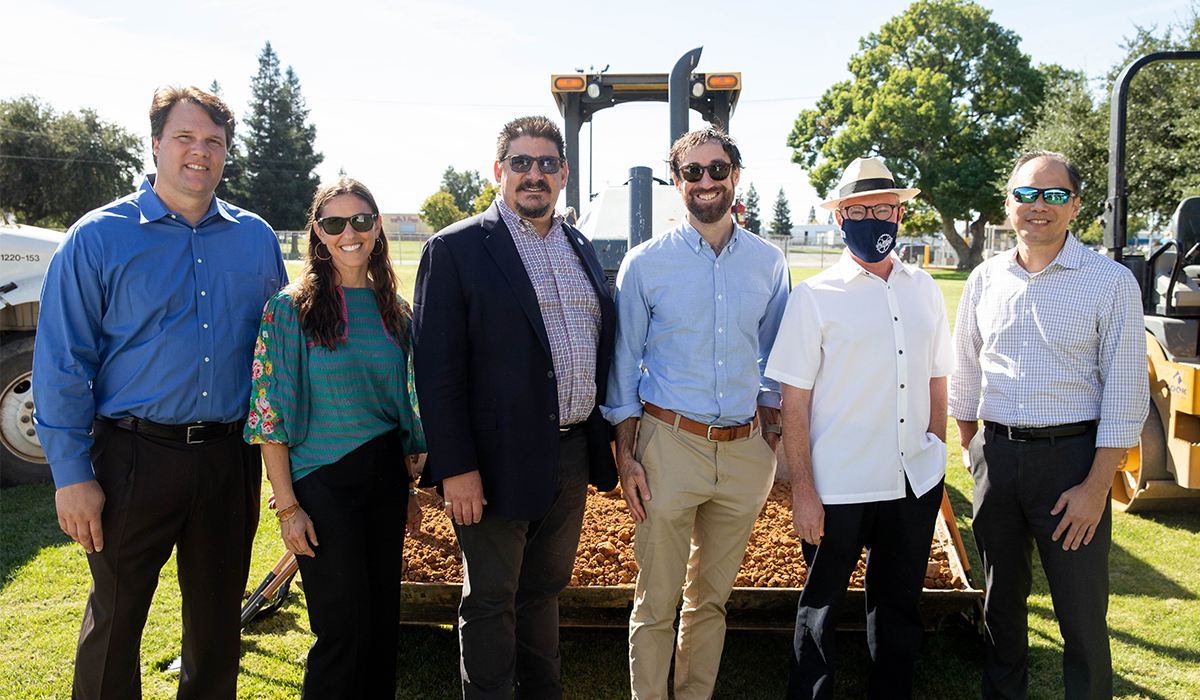
Capital Commerce Center—the landmark property, home to the former Campbell Soup Manufacturing plant in Sacramento—held a ceremonial ground breaking on September 29 to announce its $30 million redevelopment of the site. Completely modernizing the campus and driving economic growth for the region, the transformational, three-phase redevelopment plan will entail the demolition of the main manufacturing building and 14 ancillary buildings, a total of 1.1 million square feet; major sitewide infrastructure improvements; and the ultimate construction of up to six buildings totaling 1.4 million square feet and an additional investment of approximately $175 million.
The 1.4 million square feet of new space—in combination with the property’s robust infrastructure, strategic highway access and adjacent rail—will be designed to attract major manufacturing, distribution and related industrial users.
Located on 129 acres at 6200 Franklin Boulevard in South Sacramento, Capital Commerce Center was purchased in 2013 by an affiliate of Hackman Capital Partners in partnership with Rabin Worldwide. Since that time, ownership repurposed the property, creating a multi-tenant facility, and leased more than a million square feet.
“We’re excited to now usher in a new era, not only for this iconic property, but for the region itself. This development will become a multi-use destination, and when businesses come, jobs will follow,” said Nate Ellis, Senior Vice President of Real Estate at Rabin Worldwide. “We also are extremely grateful to Regional San and the County for their unwavering support of the development.”
Capital Commerce Center worked with the Sacramento Regional Sanitation District, in a private-public endeavor, to create a Transferrable Sewer Credit Program, the first-ever of its kind. The program allows Capital Commerce Center to transfer, or sell, the site’s excess sewer capacity—capacity, historically required in the production of Campbell’s soups—to other users in the SRSD district at a reduced cost. The program has significantly lowered area developers’ sewer impact fees, accelerating regional real estate investment—and for Capital Commerce Center, has incentivized reinvestment in the former Campbell’s site and generated redevelopment capital.
“The site originally exceeded the equivalent of 165 million gallons a month in sewer discharge rights, but water-use, of that scope, is no longer required by today’s manufacturers, due to modern production efficiencies. The program puts the unused capacity to work in a number of new ways: optimizing supply, reducing the burden on rate payers and, as a source of development and redevelopment capital, giving industry the incentive to grow, especially in the food, agricultural and clean energy market segments.“ Ellis said. “Our own investment in redeveloping the Capital Commerce site is a prime example of how the Transferrable Sewer Credit Program has succeeded.”
Sacramento County provided additional support for the Capital Commerce redevelopment through a building demolition fee credit program.
“It took visionary thinking and strong leadership on the part of the County and Regional San—Phil Serna and Patrick Kennedy, in particular—to develop both of these programs.” Ellis said.
Patrick Kennedy, County Supervisor and Member of the Board of Directors of Regional San, said:“We applaud everything Capital Commerce has accomplished to breathe new life into the Franklin Boulevard Corridor, South Sacramento and the entire county, since Campbell’s Soup facility closed its doors. Bringing Macy’s, Silgan, Comcast and others to our community has created hundreds of jobs. This next phase of the property’s redevelopment will launch a vital new chapter in the site’s legendary history.”
Phil Serna, County Supervisor and Member of the Board of Directors of Regional San, said:“I am proud to support the County and Regional San for its creative and forward-thinking approaches to economic development. Allowing the private sector to incentivize real estate investment with transferable sewer credits has literally never been done before. That, combined with the County’s building demolition fee credits, has poised Capital Commerce Center, and our entire region, for ongoing success.”
More on the Redevelopment
Demolition of the ancillary buildings began in August 2021 and will be followed by the razing of the main building, which is anticipated to commence as early as January 2022. Prepping the site for new construction began April 2021 and includes new electric utility service, new water mains, new natural gas main and stubs.
Tenant relocation to the building that will remain on the property is also part of the redevelopment plan. Capital Commerce will be investing $2 million in improvements to the building for Silgan Manufacturing. Comcast and Macy’s will also stay at the property. Silgan, Comcast and Macy’s lease more than a combined 670,000 square feet.
More about Capital Commerce Center
Capital Commerce Center currently includes 16 buildings on 129 acres of land in Sacramento, and was the former home of the legendary Campbell Soup Manufacturing Plant. Property highlights include incomparable water, sewer and power capacity, ideal for companies in the food and beverage industry, as well as other manufacturers. A strategic location with excellent highway access, two blocks from US 99 and within 5 miles to both Interstate 5 and Interstate 80, secured property access and STAA truck route designation make it ideal for large-scale distribution. A Union Pacific/BNSF main rail line is adjacent to property with spurs onto site. Current plans are underway to redevelop the property, demolishing 1.1 million square feet of the original structures and creating a state-of-the-art, mixed-used campus destination with up to six newly constructed buildings totaling 1.4 million square feet. Capital Commerce Center is owned by an affiliate of LosAngeles-based Hackman Capital Partners in partnership with Mill Valley-based Rabin Worldwide.
PHOTO ABOVE (from left to right) Nate Ellis and Shira Weissman from Rabin Worldwide, County Supervisor Phil Serna, Daniel Rabin from Rabin Worldwide, County Supervisor Patrick Kennedy and Hong Ho from Hackman Capital Partners.

